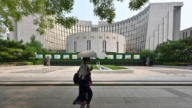【新唐人2014年02月06日讯】随着中国金融系统的外汇借贷不断加大,经济学者们担心,中国银行间的问题,会引发全球金融危机。那么,中国金融危机受害最大的将会是谁﹖请看专家分析。
1月刚刚离职的“惠誉”债信评级公司资深分析师朱夏莲,日前向英国《电讯报》宣告,中国已经开启了一个史无前例的信贷扩张,远远超过6年前震撼西方市场的金融危机,她说,中国银行的崩溃不是机会很小,而是必然的。
被称为“中国影子银行问题专家”的朱夏莲,出生和成长于美国,毕业于“耶鲁大学”。早在2009年,朱夏莲就警告,在西方金融危机发生之后,中国影子银行系统助长了信贷扩张。随着最近几周“中国工商银行”试图对其销售的信托产品撇清违约责任,朱夏莲的警告显得更加具有份量。
在过去五年内,中共银行业已经贷出了14万亿到15万亿美元。而一月下旬,“中诚信托”的“ 诚至金开1号”信托产品违约,造成30亿规模的兑付危机。
国际清算银行去年10月发布的数字显示,截至去年3月,中国的外汇贷款以及中国公司的跨境借款,已经达到8,800亿美元,比2009年上升了2,700亿美元。
朱夏莲说,快速的外汇借贷扩张,代表中国金融系统的危机,会给国际银行带来更大的风险。
大陆金融分析师任中道:“它对国内的影响确实是大于国外的,首先钱荒将成为今年的常态,中共不断的滥发货币,通货膨胀非常的严重,老百姓生活成本增加,房租已经连续涨了20个月了,企业要承担更高的利率。”
美国南卡罗莱纳大学艾肯商学院教授 谢田:“这些风险主要还是在中国自己,直接影响到中国地方债,通货膨胀、还有房地产的泡沫和股市的泡沫,信贷、钱荒的危机,肯定会在中国造成巨大的金融震荡。”
美国“南卡罗莱纳大学艾肯商学院”教授谢田指出,中国金融体系的崩溃对国外的影响,主要体现在国外驻华企业,而对于中国企业,中共可以动用3万多亿美元的外汇储备,来偿还国营企业的外汇借贷。
据《上海证券报》报导,1月份的前20天,四大银行新增贷款达4400亿,存款则负增长超过7000亿,预计1月新增贷款将超过去年的1万700亿,达到1万1000亿。
而1月29号,“交通银行金融研究中心”发布报告说,“交通银行”预计1月份新增贷款为1万1500亿元人民币。
不过一些小企业还是很难获得银行贷款。湖南一家俬人企业合伙人说,去年,他的公司一直想贷款购买一个煤矿,可一直贷不到款,最终还是通过香港拿到了8,000万港元(合1,030万美元)的贷款。
另外, 2008年全球金融海啸时,中共投入的4万亿刺激经济计划产生的经济泡沫,目前如同把可乐急速倒入杯中,日益显露出来。
任中道:“比如有目共睹的房地产的泡沫,还有金融体系,影子银行总体规模超过30万亿,相当于GDP的一半,什么意思呢,就是所有老百姓创造财富,大概超过一半可能是泡沫的情况。”
中国的影子银行和正规银行犹如孪生兄弟,其中两大阵地—–信托和理财产品,危机频频爆发。任中道指出,“中诚信托”30亿规模的兑付危机出现,表明泡沫已经开始破裂。而今年还有超过5万亿规模的信托需要兑付,将会直接影响到正规银行,而影子银行、房地产和地方债,也会像放炮竹似的,连连崩溃。
中国《证券时报》分析表示,美元的持续升值,会导致中国资产市场被迫滑落,外汇储备增加规模的自主权也会很小,利率政策也很难运用。分析人士指出,中国金融体系会因为美元的升值而变得更加脆弱。
同时,《电讯报》引述“瑞士联合银行集团”资深经济师麦戈纳斯(George Magnus)的观点认为,中国银行系统类似于80年代金融崩溃之前的日本。
采访编辑/刘惠 后制/钟元
Chinese Currency Crisis Could Lead to Permanent Money Shortage
With the rapid expansion of foreign-currency borrowing,
economists worry China’s banking system could lead to a
bigger risk for international banks.
Who are the victims of China’s economic crisis?
The following is our experts’ analysis.
Charlene Chu, a former senior analyst at Fitch in Beijing told
The Telegraph that, China has embarked on an unprecedented
experiment in credit expansion that far exceeds anything seen
before the financial crisis that rocked Western markets
six years ago.
She remains adamant that a Chinese banking collapse of some
description remains not just an outside chance, but a certainty.
Born and raised in America and a graduate of Yale, Ms Chu
has been warning since 2009 about the growth of a shadow
banking system in China that has helped fuel the credit expansion
seen in the country in the wake of the Western financial crisis,
reported The Telegraph.
The recent news of the Industrial and Commercial Bank of
China (ICBC) near default on the trust product has made
Ms. Chu’s warning even more meaningful.
In the past five years, Chinese banks have created lending
close to $15 trillion. A 3 billion-yuan ($490 million) investment
product, Credit Equals Gold No.1, a wealth management product
sold by the ICBC might default on January 31,
when it was due to mature.
Figures published by the Bank for International Settlements
(BIS) in October showed foreign currency loans booked in
China, as well as cross-border borrowing by Chinese companies,
had reached $880bn (£535bn) as of March 2013, from $270bn
in 2009, reported The Telegraph.
Charlene Chu told The Telegraph, “The rapid expansion of
foreign-currency borrowing meant a crisis in China’s financial
system was becoming a bigger risk for international banks."
Ren Zhongdao, financial analyst: “The impact on domestic
Chinese is greater than on foreign countries.
Money shortage has become a norm this year.
The abuse in cash printing has created severe inflation.
The cost of living has increased, rents have gone up for 20
consecutive months,
and industries are bearing higher interest rates."
Xie Tian, School of Business Professor, University of South
Carolina Aiken: “The risks are mainly to the Chinese.
It directly affects local government debt, increases the risks of
inflation, real estate bubble, stock market bubble, loans,
money shortage, and huge financial crisis in China."
Professor Xie Tian points out that the impact of Chinese
banking collapse to foreign countries will be mainly on foreign
enterprises in China, because for the Chinese enterprises,
the Communist regime has over $3 trillion foreign exchange
reserves to repay foreign currency loans for the state-owned
enterprises.
According to the ShangHai Securities News, China’s four
major banks total new loans have reached 440 billion yuan for
the first 20 days of January, negative deposits growth of over
700 billion.
The total new loans in January are expected to reach 1.1 trillion,
exceeding last year’s 1.07 trillion yuan.
Bank of Communications issued a report on January 29, an
expected new loans for January of 1.15 trillion yuan.
But some small businesses are still experiencing difficulty
in obtaining bank loans. According to a Hunan businessman,
his company could not get a loan to buy a coal mine until
finally a loan of $10.3 million was obtained through Hong Kong.
In addition, China’s 4 trillion economic stimulus plan in 2008
during the global financial crisis has started to see economic
bubbles like rapidly poured soda.
Ren Zhongdao: “For example, the real estate bubble is very
obvious. The financial system such as the shadow banking has
accumulated more than 30 trillion of wealth, equivalent to
half of GDP.
What does it mean? That means half of the wealth created by
the people are bubbles."
The official banking system and the shadow banking are like
twins in China. Troubles around the trust and wealth
management products of the banking system have frequently
erupted.
Ren Zhongdao indicates the 3 billion-yuan default crisis of
ICBC trust products suggests the bubbles have started to burst.
More than 5 trillion yuan of trust is yet to mature this year.
The official banking system will be affected, and shadow
banking, real estate, local debts will collapse like domino effect.
China’s Securities Times analyzed the continued appreciation
of the dollar will force the fall of Chinese asset markets,
little autonomy in increasing foreign exchange reserves,
and hard to control interest rate policy.
Analysts pointed out the vulnerability of the Chinese financial
system to a rising dollar.
“George Magnus, senior independent economist at UBS, said
the Chinese banking system resembled that of Japan during
the 1980s in the years leading up to the country’s financial crash",
said the Telegraph.
Interview & Edit/LiuHui Post-Production/ZhongYuan






























